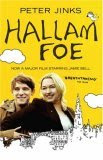
I saw the film Hallam Foe back in September. Intrigued by the characters and the storyline – and spurred on by a comment from The Killing Moon - I ordered the book on Amazon. And I read it yesterday.
Peter Jink’s novel Hallam Foe isn’t too thick (though the font size is pretty small), and I’d three quarters of the book read on the BD96 flight home last night from Heathrow, and finished off the rest before dropping off to sleep.
The rare satisfaction of finishing a book in a single day (over two sittings)!
The character of (film) Hallam played by Jamie Bell is straight out of the book. The early chapters were lifted into the screenplay with only minor changes (like the family home being in Peebles rather than the book’s Leicester).
Having already seen the film, it was interesting to think about the differences in approach. The way that the screenplay had taken the ideas and circumstances of the book and had then adapted them for the big screen. While there are a few original twists and turns in the film, nearly everything has its origin in the original story. Just a bit of a cut and paste on the storyboard!
The main plot change comes when Hallam goes up to work in Edinburgh. Whereas the film has him working in a hotel (and living in the picturesque click tower), the original fiction character works in a charity office encouraging dottering grannies to leave endowments in their (soon to be read) wills to Cancer Research. Hallam’s boss Kate still had a lousy boyfriend in the book (though not married like the film).
In the book, Hallam’s journey has a satisfying flow: from home to Edinburgh, and then back home. The finale, set on the estate, has tension and humour as Hallam plots his revenge on his step-mother Verity.
I notice looking back on my review of the film that I commented:
“While your understanding of Hallam’s personality traits grows throughout the film, his actions become harder to justify, and his relationships become destructive ...
Hallam Foe’s a dark tale, set against the distinctive backdrop of Edinburgh’s stony architecture and rooftops. As you start to understand the characters, their lives become more and more uncomfortable to watch, with empathy replaced by fear and amazement.”
I found the book’s Hallam to be much more consistent, more reasonable and more comfortable. The film had slowly twisted him, and given him a complicating edge that the novel didn’t require.
So I can now recommend both the novel and the film. A good read for a long journey. Now I wonder what Jinks’ next book Intuition will be like?
No comments:
Post a Comment